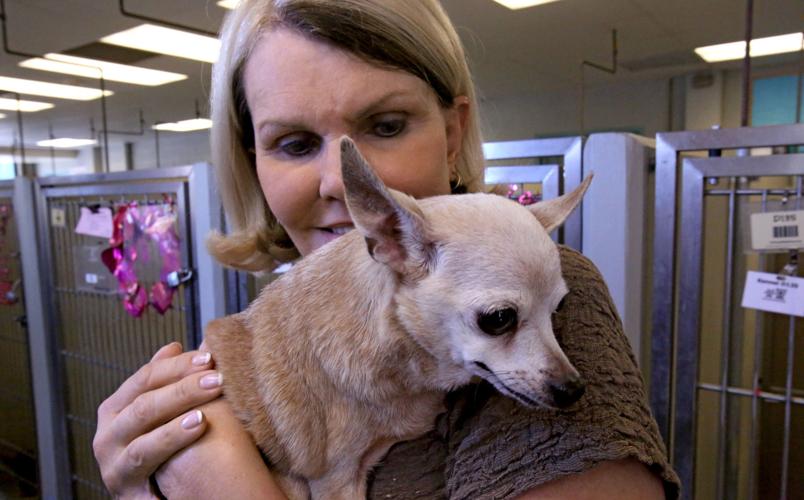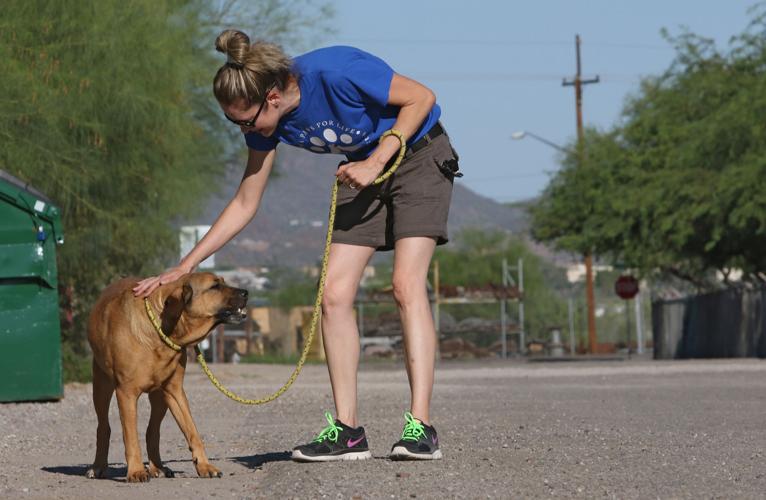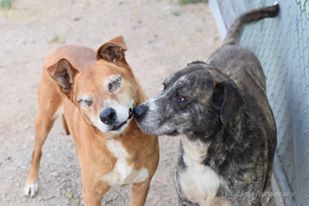Cheerio and Fubu lived most of their lives together as backyard dogs before they were surrendered to the Pima Animal Care Center last spring.
Seven-year-old Cheerio’s painful glaucoma had long been neglected, and 8-year-old Fubu suffered from advanced dental disease.
At PACC, their lives began to turn around.
Thanks to donations from the community, the shelter’s veterinary team removed Cheerio’s painful eyes and gave him the medications he needed to heal.
They fixed Fubu’s teeth, and also neutered both dogs, preventing unwanted litters and health problems down the road. The bonded pair were ultimately adopted together.
Once one of the most high-risk populations in the nation’s shelters, homeless senior pets are increasingly enjoying second chances.
“More and more people are willing to open up their home to senior pets,” said Karen Hollish, PACC’s director of development and marketing.
November is Adopt-a-Senior-Pet Month, and shelters and rescue groups throughout the Tucson area have senior dogs and cats waiting to be adopted.
Some of these seniors have had homes but lost them for traumatic reasons ranging from an owner’s death, divorce or move, to the family that once cherished them now wants a younger animal. Others arrive at the shelter having never known the comfort of a bed, having spent most of their lives in a backyard or running as a stray.
Increasingly, Pima Animal Care Center and other rescue organizations have become the turning point that gives senior animals a chance at a better life—for however long that may be.
When the month started, 96 of the county shelter’s adoptable animals were age 6 years and above. Some as old as 18 have found homes.
Part of the equation is that PACC’s veterinary team, led by director of veterinary services Jennifer Wilcox, is able to save more animals and make them more adoptable. “She sees a lot of second chances in senior pets that a lot of people didn’t see before,” Hollish said.
The overall save rate for senior pets at PACC has increased to 92 percent as the shelter moves toward a no-kill approach.
“Many of our seniors undergo dental surgery to remove some or even all of their teeth,” Hollish said. PACC’s dental equipment — including two cleaning/polishing machines and a dental X-ray machine — was funded by Friends of Pima Animal Care Center, which is PACC’s nonprofit partner.
Still, PACC’s medical team does not have the staffing to take on complex medical cases, so it does what it can. Poodles with accelerated dental disease and matted fur are among the easiest to turn around, Wilcox said. Aging is harder when large dogs carry extra pounds that accelerate arthritic conditions.
PACC staff and volunteers also take extra care with senior animals, such as providing soft food or an extra supply of soft bedding to help cushion old joints.
Overall, Hollish said, age is no longer such an challenge. “It might be easier for us to place a senior dog who might be blind in one eye ... and harder for us to place a younger dog that’s aggressive toward other dogs.”
Not only are seniors generally calmer than younger animals, they are more likely to have had some training. Some people find it easier to adopt an older animal instead of a puppy or kitten that may outlive them.
PACC is working to get signage printed to put on senior pets’ kennels, she said. All members of the “Silver Whiskers Club” (age 7 years and above) have no adoption fee.
“We’ve come a long way with seniors. We want to bring that progress to every segment or type of pet in our shelter,” said Hollish, who adopted her senior dog a couple of years ago. Now toothless from years of dental decay, he’s perked up in his new home.
Elias at 13 is the most senior dog at Pima Paws for Life, a nonprofit no-kill shelter on Tucson’s northwest side.
The 25-pound Chihuahua was taken to PACC after he was either thrown or fell out of a van, and was transferred to Pima Paws for Life to recover from an upper respiratory illness. He doesn’t like to be picked up but loves to snuggle and give kisses, said Laura O’Brien, the nonprofit’s fundraising and development director.
Buddy, an Australian shepherd mix taken to PACC with a smaller dog after their owner passed away, also arrived at Pima Paws for Life to recover from an upper respiratory illness, and went up for adoption. He waited week after week, but potential adopters turned away when they saw he was nearly 12. “He’s still very young at heart,” O’Brien said.
Fortunately, there are people who look to adopt seniors — some because they don’t want their pet to outlive them, O’Brien said, “and also because they feel bad for them because they do get overlooked.”
Once Buddy was adopted, it didn’t take him long to settle into his new home, where he gets to walk the neighborhood — at a seriously brisk pace — twice a day.
“Part of it really is the no-kill revolution,” said Cara Ryan, one of the founders of RAD Rescue (Rehabbing & Advocating for Dogs), a nonprofit group that has taken in senior or medically needy dogs from PACC. “It used to be shelters and rescue groups could only save so many animals and so many of the most adoptable were saved first. The no-kill movement is trying to save every life.”
Ryan said she is often surprised at the turnaround older animals make once they feel secure in a loving home. “They really appreciate everything,” said Ryan, who was 4 when she rescued her first dog.
“People are recognizing the beauty of a senior life,” Ryan said. “They have so much love to give they make us more reflective.”
Coming to a shelter after knowing a home is extra hard. “The stress on an older animal coming to a shelter like ours is enormous,” Wilcox said.
At the same time, they recognize and appreciate a second chance. Even if it’s just for a little while.
Connor was a 10-year-old pitbull who looked more like 20 when he arrived at the county shelter as a stray. He suffered from bloat and could no longer stand on his own.
With Connor, Ryan said, “you have an old dog who maybe has gone through life never having had any proper care and never having the love that a dog should have. Connor was a dog who was defeated. He really had nothing to live for.
“No life should end that way.” Ryan took him home to offer hospice care. With proper medicare care, nutrition and lots of love and attention, his final months were active and happy.
“A lot of people when they lose their pet they withdraw,” Ryan said. “The best way to combat that sadness is to jump back in there and do it again.”







